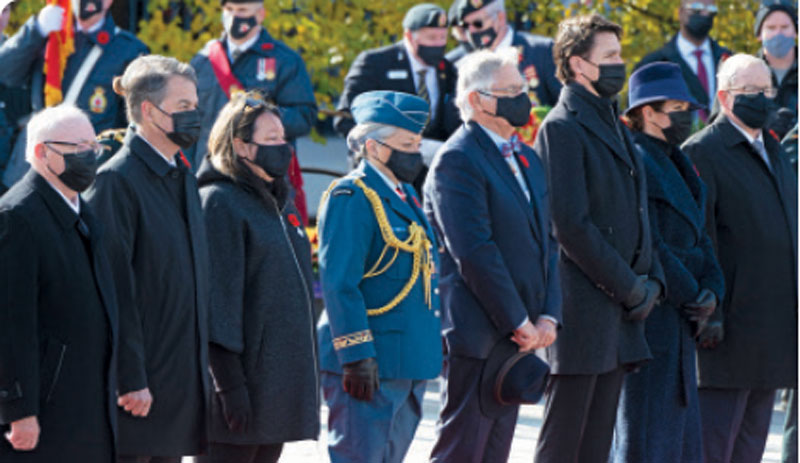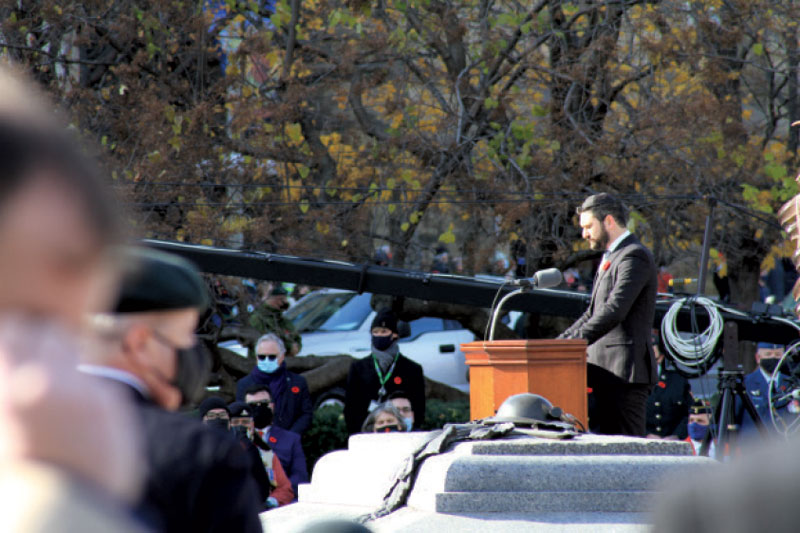
A veteran prepares to place his poppy on the Tomb of the Unknown Soldier in Ottawa after the Remembrance Day ceremony. [Metropolis]
As the ceremony’s 11 o’clock start time approached, a wave of spectators wearing red poppies amassed. Among the thousands were veterans, active armed forces members, family of military personnel and people without ties to the military, there simply as a gesture of respect.
“I was here last year, among the five people who stood way down at the end of the road,” said Adwin Gallant, a 28-year veteran of the Royal Canadian Air Force. Gallant said he has been to every Remembrance Day ceremony in Ottawa since 1995. “The fact that the public is here makes it more meaningful…because they get to see the appreciation of what people have done before us.”
“I always get quite inspired…just seeing what they’ve done.”
Sergeant Kyle Crego arrived early to the ceremony, clad in impact a neon green first-responder’s parka. A 10-year volunteer with St. John Ambulance and a 12-year member of the Governor General’s Foot Guards army reserve, Crego chose to spend the ceremony serving as a paramedic. Few serious medical issues arise during the ceremony, he noted, save for the occasional faint or fall. But Crego was glad to be there providing a service for his fellow military members.
“I just want to be here for the soldiers in uniform,” he said. “The medical staff here do a good job but they’re [spread] thin, so I like to come in and just be in the chain and try and help out.
“[Remembrance Day] is, to me, mostly about reflection over the people who have unfortunately been lost, those who have come before and those who serve today. I get a lot of pride from it. There’s a lot of people walking around in uniform with stories on their chest, in their medals. I always get quite inspired…just seeing what they’ve done.”

Dignitaries including National Memorial (Silver) Cross Mother Josée Simard, Governor General Mary Simon and Prime Minister Justin Trudeau stand during the Remembrance Day ceremony. [Metropolis]
There was no veterans’ parade this year, a result of pandemic restrictions. Black sedans and SUVs arrived late—due to a security issue investigated by the RCMP a few minutes before the ceremony. Governor General Mary Simon, Prime Minister Justin Trudeau and Sophie Grégoire Trudeau, and 2021 National Memorial (Silver) Cross Mother Josée Simard soon took their positions.
Simard is the mother of Corporal Karine Blais, who was killed by a roadside bomb in 2009, making her the second Canadian woman to die in combat in Afghanistan. Simard’s role as Silver Cross Mother is to represent all mothers in Canada who have lost a child in military service.
Black sedans and SUVs arrived late—due to a security issue.
When asked about her daughter, Simard described her happy memories, the hopes that Blais had held for the future and the impact her death had on the people in her life. “Karine adored Christmas. We baked a gingerbread house together every year. At first snow, we had hot chocolate. She had a contagious laugh and a cheerful disposition.
“Coming back from [her] mission, she wanted to start a family—I already bought a cradle and everything—and to continue her career in the army.
“When Karine died, my life stopped; time stopped for many people. Our lives are restarting a little bit every year.”
Because of the delayed arrival of the dignitaries, the first few minutes of the ceremony were disjointed: Simard and the Trudeaus arrived at their positions after the tolling of the bell and 21-gun salute had begun. The Governor General arrived during the two minutes of silence, the sounds of police motorcycles cutting through the quiet. Simon took her position after a flyover by two CF-18 Hornet fighter jets, which was originally scheduled to take place 15 minutes after her arrival.

Legion poster and literary contest winners Ryan McCardle and Louise McCrow place a wreath representing Canada’s youth. [Metropolis]
“O Canada,” sung by the Ottawa Children’s Choir, was followed by “Last Post,” “The Lament” and “The Rouse.” The Act of Remembrance was read in English by The Royal Canadian Legion’s Dominion President Bruce Julian, in French by Dominion Grand President Larry Murray and in the Indigenous language of Michif by Métis veteran Paul Pirie.
There was a notable absence during the ceremony. Rabbi Reuven Bulka, who had performed the Remembrance Day benediction since 1991, died in June after a six-month battle with cancer. As the Legion’s honorary chaplain, Bulka gave many speeches that spoke of loss, courage, brotherhood and sacrifice. His words have touched the lives and hearts of many across the country and his absence added another layer of grief to the sombre ceremony.
The Legion invited Rabbi Idan Scher to present this year’s benediction. Scher is, in many ways, Bulka’s successor: he leads the congregation at Machzikei Hadas, the synagogue Bulka led for nearly 50 years, and he was referred to as Bulka’s protégé in an article by the Canadian Jewish News.
Spectators then descended on the tomb, quietly placing their poppies.
“I stand here today with overflowing emotion,” said Scher. “With the weight of history and memory, both recent and past, on my heart…. I stand here today and reflect on these stories and the countless others they represent.”

Rabbi Idan Scher presents the annual benediction, honouring both Canada’s veterans and the late Reuven Bulka. [Trevor Oattes]
Scher touched on many of Bulka’s favourite themes: the sacrifices of brave men and women, the continued fight for freedom around the globe and the actions of service members on home soil, combating floods and fires around the country. He made special note of the veterans who returned “with body intact” but with the “deep, invisible wounds” of trauma and mental illness. He ended his speech by quoting a passage from Bulka’s final Remembrance Day benediction in 2020—presented just eight months before his death.
“‘Let us continue to make Canada worthy of our veterans’ ongoing dedication and sacrifice; a country defined by respect, harmony, inclusion, responsibility and kindness to all.’”
A bilingual rendition of “God Save the Queen” followed Scher’s speech, ending the formal ceremony. The dignitaries then spoke with the assembled veterans and guests of honour, rows of medals glinting on the chests of many, before laying poppies on the Tomb of the Unknown Soldier. Spectators then descended on the tomb, quietly placing their poppies down on it, covering it in red.
Robert Henry, a 30-year veteran of the RCAF, watched as his son-in-law, Petty Officer Second Class Jacob Russell, relieved the sentries from duty. Remembrance Day holds a special place in his heart, he said, coming from a long line of veterans, including some who never made it home.
“My father served in World War II. I have uncles who served in World War I. I’ve had uncles die overseas…. This all means a lot to me, as a military guy,” said Henry. “I’ve been to Vimy. I was at the 100th anniversary of the Armistice in Mons, Belgium.… Remembrance Day means a lot, to everybody.”
Advertisement



















